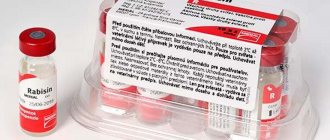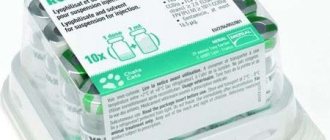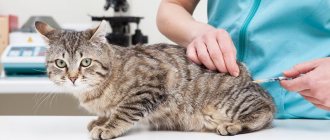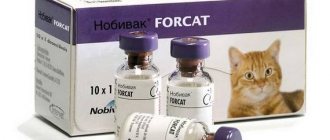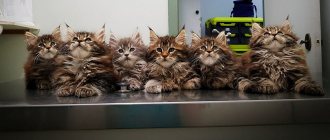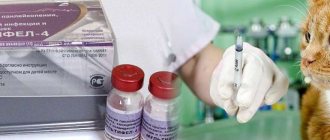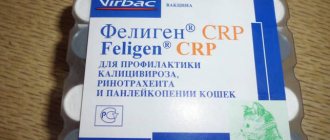Vaccination of animals is an important preventive measure. After vaccination, a kitten may experience some side effects and sometimes serious complications. At the same time, it will help protect the pet and owner from dangerous diseases. A caring person needs to know what reactions to vaccination may be in order to be prepared for it and try to avoid it. It is worth remembering that a rabid cat is contagious and dangerous to others.
Which ones are needed?
Some people believe that if a cat does not walk outside, then vaccinations are not necessary. But that's not true. An infectious disease that is dangerous for animals can be brought home on shoes. If the animal is accustomed to walking, then it is necessary to carry out a complex of vaccinations. Mandatory vaccinations include distemper, rabies, feline herpes and calcivirus. At the owner's request, the cat is vaccinated against chlamydia.
The first vaccination of a kitten is carried out at the age of 8-10 weeks against rhinotracheitis, calcivirus, panleukopenia. Revaccination - after 3-4 weeks. Rabies vaccinations are given no earlier than 12 weeks and repeated annually. It is recommended to use the vaccine from the same manufacturer each time. Especially if the cat tolerates it well. Quarantine after vaccination lasts 10-14 days, it is during this period that immunity to the disease is developed. It is necessary to limit the kitten from being outside and from contact with other animals, especially unvaccinated ones.
Manufacturers and brands of vaccinations
No vaccine manufacturer guarantees the absence of complications. There are vaccines for which complaints are received more often (Nobivac) and less frequently (PureVax). Other common brands that we do not mention in the article are recommended to a lesser extent. Let's look at the medications that veterinarians usually offer.
Nobivac
Nobivac vaccines (Nobivac, Holland) come in several varieties: Nobivac Tricat against viral rhinotracheitis, calicivirus and panleukopenia, Nobivac Rabies against rabies, etc. There are many complaints about these vaccines. There are serious consequences. Recently there was information in the English-language news that entire batches of the drug led to deaths. However, so far nothing has been proven on this score and the Nobivac vaccine is used by most veterinarians - as a rule, without consequences. In many localities, it remains one of the few ways to protect the animal.
Felocell
The Felocell vaccine (Felocell, USA) is intended for immunization of cats against viral rhinotracheitis, calicivirus infection, panleukopenia and chlamydia. The disadvantage of the quadrivalent vaccine is that it contains a component of chlamydia (it was written above that it is this that causes the main complications). It is better to stick with the trivalent vaccine.
This brand also has a rabies vaccine. As for complications after Felocell, they also occur, but not so often.
Purevax
PureVax (France) is a much less common vaccine. However, veterinarians praise the drug: complications from it rarely occur.
"Purevax" provides immunity from panleukopenia, calicivirus, rhinotracheitis and rabies. It is especially worth paying attention to rabies vaccines, which will be discussed below. In general, Purevax preparations are considered much more environmentally friendly than analogues from other companies.
Disadvantages: higher price and unavailability in many localities. At the same time, ordering the drug via the Internet is dangerous, because... there is no guarantee that it will arrive, as expected, refrigerated.
Felinologists warn that allergies and autoimmune reactions are often observed with the Biofel vaccine; the Multifel vaccine is well tolerated, but its ability to develop immunity is questionable. There are also complaints of numerous allergic reactions to the Felovax vaccine.
Why is vaccination necessary?
It is important to have regular vaccinations for the following reasons:
If an animal is not vaccinated against rabies, then when it becomes ill, it becomes potentially dangerous to everyone.
- The diseases against which vaccines are created are deadly for animals. If an unvaccinated cat gets sick, then there is a high chance that everything will end in death.
- A sick cat poses a danger to other pets.
- Some diseases, such as rabies, are dangerous to humans. A cat can infect its owner. This disease is fatal to any living creature.
Rabies in cats
Rabies (hydrophobia) is a deadly viral zoonotic disease of domestic and wild animals. The disease is provoked by a specific neurotropic virus from the rhabdovirus family, which penetrates through nerve fibers into the spinal cord, brain, and salivary glands of animals.
In this disease, which inevitably ends in the death of animals, the central nervous system is affected. Hydrophobia is a zoonotic disease, that is, common to animals and humans.
The carriers of infection are predators and wild carnivores. Infection of cats occurs directly through a bite when the integrity of the epidermis and mucous membranes are damaged. The virus multiplies in the salivary glands of infected individuals.
Rabies is noted in cats of various age groups and breeds. The infection occurs acutely, subacutely, and less often – chronically. Symptoms of infection increase gradually. The intensity of clinical manifestations depends on age, immune potential, virulence, concentration of the virus in the animal’s body, as well as the location of the bite.
Important! Before the first symptoms characteristic of hydrophobia appear, the rhabdovirus is contained in the saliva of infected individuals, which are hidden virus carriers. An apparently healthy pet can infect humans and other animals.
The risk group includes small kittens with a fragile immune system, animals weakened by viral and bacterial diseases, as well as unvaccinated cats. Therefore, if you care about the life of your pets, do not neglect vaccinations.
Dangerous consequences
Allergy to vaccine
Sometimes vaccination provokes an allergic rash in furry cats.
If the animal is allergic, the injection is administered under the influence of an antihistamine. If there was no allergy to the first vaccination, this does not mean that it will not happen again. The substance can accumulate and cause complications in the cat after vaccination. Can be light or heavy. It manifests itself in the form of rashes, itching, swelling of the mucous membranes, and in severe cases - of the respiratory tract and internal organs. Rarely - anaphylactic shock. Requires immediate medical attention. There may also be hair loss, loose stools, vomiting, altered behavior, and the cat becomes lethargic.
The pet is limping
After vaccinations, the cat may develop lameness, a lump at the injection site, a lump, swelling, or a ball under the skin. These symptoms go away after a few days, but sometimes last a long time. May be due to inept administration of the vaccine by a veterinarian or an individual reaction. Sometimes when the drug gets into a nerve ending or vessel. If the injections are injected into a large nerve and it is damaged, sometimes the hind legs even fail.
Mild course of the disease
Removing worms on the eve of the procedure guarantees a normal immune response to the vaccine.
After vaccination, the cat may get sick. This occurs due to reduced immunity due to worms, inflammatory processes or indolent diseases. Vaccination should be carried out when the animal is in full health, and anti-worm tablets should also be given before it. If the cat had contact with sick pets, that is, when the quarantine had not yet passed, then it is not surprising that it became infected. During this period, the immune system is weakened.
Kidney failure
Scientists have identified the relationship between the complex vaccine and this disease. These drugs are produced from cat kidney cells. Action - once in the body, antibodies begin to be produced against the same kidney cells, destroying them. As a result, kidney failure occurs. The reason is frequent vaccinations. This complication occurs rarely.
Sarcoma after vaccination
During rabies prevention, the animal may develop sarcoma.
A malignant cancerous tumor may develop at the site of vaccine administration.
Called sarcoma. This happens very rarely. But such a formation grows quickly, and the result is that the cat died. This happens after a rabies vaccination that contains an adjuvant substance. Its actions are associated with causing an inflammatory process at the injection site and the formation of strong immunity. It is recommended to purchase vaccines without it. If the cat gets sick, in the early stages of the sarcoma an operation is performed to remove it, an injection is given intramuscularly into the paw - amputation is done.
Varieties of vaccine
In the state veterinary clinic, the animal is given a free domestic vaccination. To obtain an imported drug, you must go to a private clinic.
There are 3 types of vaccine:
- Live: it contains weakened types of the virus. Their advantage is that they develop strong and long-lasting immunity. But there is a chance that a real disease will develop. This will happen if the animal is weakened or has low immunity. Therefore, before vaccination, you need to make sure that your pet is healthy.
- Inactivated: The vaccine contains killed viruses. The drug creates weaker immunity, its effect is shorter, but the vaccination takes place without complications.
- Complex: several viruses are present. Very convenient for kittens who receive several vaccinations over a certain period of time.
It is recommended that vaccination be carried out within the walls of a veterinary clinic, where the drugs are stored under proper conditions.
What to do if complications occur?
If your cat has a reaction to vaccination, you need to take the following measures:
- If there is a lump or swelling at the injection site, doctors recommend massaging this area. Most often appears in the withers area. The same is done if the cat is limping.
- The lump turns into an abscess - antibiotics or surgery are prescribed to remove it.
- In case of nerve damage and paralysis, long-term therapy is carried out.
- If an allergic reaction occurs, you need to give your cat antihistamines. Anaphylaxis can manifest itself in the form of convulsions, loss of consciousness, and affects the gastrointestinal tract. If your pet feels sick or vomits, it may be a manifestation of an allergy. Urgent help from a veterinarian is needed with the administration of antihistamines and droppers to relieve intoxication.
- If the temperature rises, give an antipyretic.
If complications occur, you must inform your veterinarian.
Prevention
In order for everything to go well, it is better not to carry out disease prevention while the animal is pregnant.
To minimize the risk, you must adhere to certain rules. The vaccination must be done by a specialist in the clinic, so that the cat is under the supervision of a doctor for an hour. It is necessary to check the expiration date of the vaccine. Injections should be given when the animal is healthy and not wormed. Adhere to the vaccination and revaccination dates. After vaccination, do not bathe, do not wash the injection site, and do not overcool. Be sure to comply with quarantine. During teething in kittens and pregnancy in adult cats, it is better to abstain.
The owner should monitor the pet's condition in the first week. The cat stopped eating and drinking, vomited, a wound or other symptoms listed above appeared at the injection site; this must be reported to the veterinarian. Only he will decide whether to take measures for treatment. If a cat vomits, this may be a common individual symptom, or it may indicate the onset of anaphylactic shock.
